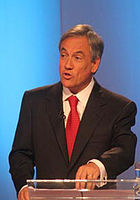Chilean presidential election, 2005-2006
|
|
|||||||||||||||||||||||||
|
|||||||||||||||||||||||||
|
|||||||||||||||||||||||||
|
|
|||||||||||||||||||||||||
| Presidential runoff election results map. Blue denotes communes won by Piñera, Red denotes those won by Bachelet. | |||||||||||||||||||||||||
|
|||||||||||||||||||||||||
A presidential election took place in Chile on Sunday, December 11, 2005. None of the four candidates received an absolute majority, thus a runoff election among the top two candidates —Michelle Bachelet from the Coalition of Parties for Democracy and Sebastián Piñera from National Renewal— was held on Sunday, January 15, 2006. Bachelet was victorious with 53.49% of the vote. She succeeded President Ricardo Lagos on March 11, 2006 for a period of four years, after Congress reformed the Constitution in September 2005 and reduced the term from six years.
The 2005 Chilean parliamentary election was held in conjunction with the presidential election.
Bachelet, who led in every major poll, served as Health Minister before President Lagos named her as Chile's first female Defense Minister in 2002. She was supported by the Coalition of Parties for Democracy, which has governed Chile since 1990. The coalition groups four parties: the Christian Democratic Party (PDC), the Party for Democracy (PPD), the Socialist Party (PS), and the Social Democrat Radical Party (PRSD).
...
Wikipedia



